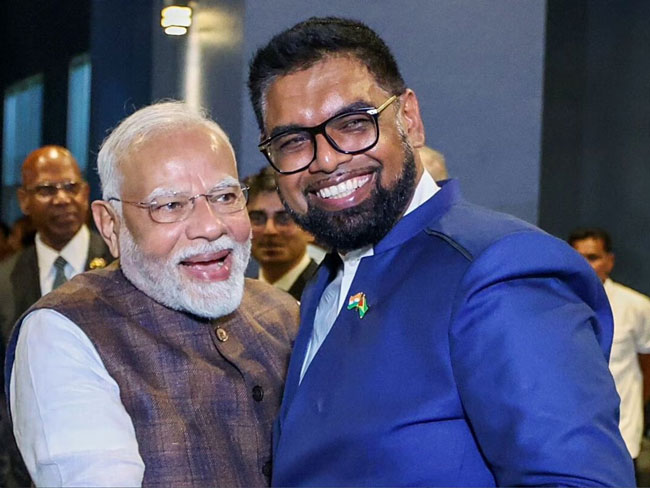Prime Minister Narendra Modi arrived in the Caribbean nation of Guyana, marking the final leg of his three-nation tour. This visit is significant as it is the first time in 56 years that an Indian Prime Minister has visited Guyana. Upon arriving in the capital city of Georgetown, PM Modi expressed that his visit would further deepen the friendship between the two nations. At the airport, he was warmly received by Guyana’s President Irfan Ali, Prime Minister Mark Anthony Phillips, and over 12 cabinet ministers. The Prime Ministers of Grenada, Deacon Mitchell, and Barbados, Mia Amor Mottley, were also present at the hotel to welcome him.
As a token of goodwill, Modi was presented with the ‘Key to Georgetown,’ symbolizing the strong bilateral relations between India and Guyana. Invited by President Irfan Ali, Modi is scheduled to stay in Guyana until November 21. According to the Ministry of External Affairs, there are around 320,000 people of Indian origin in Guyana. Modi will also meet with leaders from Caribbean nations during the second ‘India-CARICOM’ summit. This visit is crucial as China’s growing influence in Guyana has become a significant concern for India in the region.
China’s Growing Influence in Guyana
China’s presence in the small yet resource-rich nation of Guyana has been steadily expanding since 2017. Beijing is not only strengthening military, economic, and infrastructural ties with Guyana but also aiming to assert regional dominance in the Caribbean. Through its Belt and Road Initiative (BRI), China is actively expanding its influence in the region.
China has invested in various key infrastructure projects in Guyana, including the Arthur Chung Conference Centre, Cheddi Jagan International Airport, and the East Bank Demerara Highway. Moreover, Chinese companies have made significant investments in renewable energy, hydroelectric power, and telecommunications. China’s expanding presence has also extended to military assistance, including the provision of Y-12 patrol aircraft and other equipment for military training purposes.
Why Guyana Is Important for India
Guyana’s growing strategic importance for India is clear, as the country offers valuable opportunities in the energy sector. With vast oil reserves, Guyana is emerging as a key partner for India. The two-way trade between India and Guyana reached $223.36 million in 2021-22, largely driven by energy products. Guyana’s vast oil reserves, which exceed 11 billion barrels—three times the size of Kuwait’s reserves—make it an attractive partner for India’s energy needs. As Guyana prepares to become one of the top oil producers globally by the end of this decade, India is eager to expand its role in this growing sector. Companies like ONGC are already exploring opportunities in Guyana’s oil and gas fields.
Strengthening Bilateral Relations
Guyana’s strategic location presents an opportunity for India to strengthen its presence in the Caribbean. Traditionally dominated by the US and Western powers, the region is now seeing more engagement from India, particularly through technology, renewable energy, and defense cooperation. In recent years, Guyana has increasingly turned to India for support. Earlier this month, Guyana’s Chief of Defence Staff, Brigadier Omar Khan, visited India to enhance defense cooperation between the two countries. Additionally, India had previously supplied two Dornier-228 aircraft to the Guyana Defence Force.
Culturally and historically, India and Guyana share deep ties. Nearly 40% of Guyana’s population is of Indian descent, with their ancestors having been brought to the country as indentured laborers during British colonial rule in the 19th century. During his visit, Prime Minister Modi will pay tribute at the Indian Arrival Monument, which commemorates the arrival of the first Indian laborers. He will also address the Guyanese Parliament and meet with the Indian community.
China’s Growing Concern
China is likely to be concerned about India’s growing influence in Guyana. If India strengthens its cultural and historical ties, it could pose challenges to China’s ambitions in the region. Beijing’s efforts to dominate the oil, gas, and mineral industries could be hindered by India’s strategic and cultural engagement. In military and infrastructure sectors, China’s plans could face obstacles as India continues to strengthen its position.
PM Modi’s visit to Guyana is, therefore, not just a diplomatic milestone, but a strategic move to secure India’s interests in the Caribbean while countering China’s increasing influence in this vital region.




